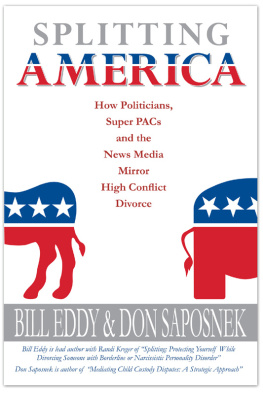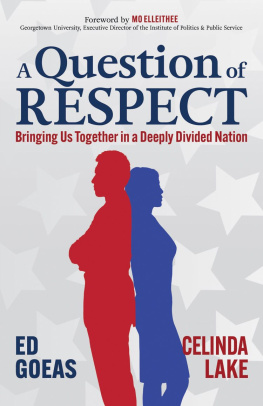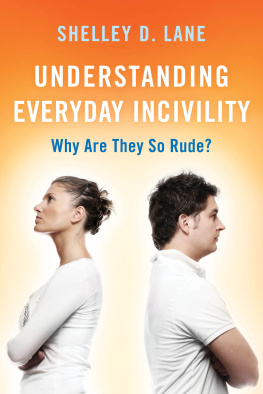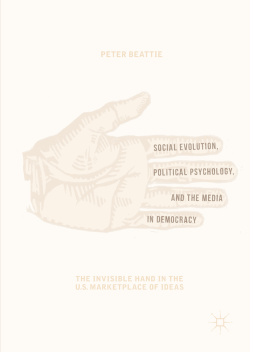Table of Contents
DISRESPECTFUL DEMOCRACY
EMILY SYDNOR
DISRESPECTFUL DEMOCRACY
The Psychology of Political Incivility
Columbia University Press / New York
Columbia University Press
Publishers Since 1893
New York Chichester, West Sussex
cup.columbia.edu
Copyright 2019 Columbia University Press
All rights reserved
E-ISBN 978-0-231-54825-0
Library of Congress Cataloging-in-Publication Data
A complete CIP record is available from the Library of Congress.
ISBN 978-0-231-18924-8 (cloth: alk. paper)
ISBN 978-0-231-54825-0 (e-book)
LCCN: 2019021844
A Columbia University Press E-book.
CUP would be pleased to hear about your reading experience with this e-book at .
Cover design: Lisa Hamm
CONTENTS
W RITING A BOOK is no easy feat, yet it pales in comparison to the challenge of articulating my gratitude for the individuals and institutions that have helped me through this process. First and foremost, I have to thank Columbia University Press and Stephen Wesley, who championed this project from the moment I showed up at APSA thinking it could be a book. Even when he was buried under piles of acquisitions and managing dozens of authors, he read drafts, offered insightful comments, and helped me navigate the challenging waters of the dissertation-turned-book process.
It is rare in academia that you find a university and a department that are well suited to your strengths and preferences, and even more so to find that home as an ABD grad student. But from the first thirty-minute interview I had with Alisa Gaunder and Shannon Mariotti, I knew Southwestern was one of those places. Since I started at Southwestern, Alisa Gaunder has carved time out of her busy schedule as dean to be my department colleague, offering advice about the publication process and strategies for effective project management. Shannon Mariotti and Eric Selbin have helped me navigate drafts and reviewer responses and talked ideas out over lunches and in the spare moments between classes. Bob Snyder helped me keep the project relevant to contemporary politics as we struggled with current events over 600 Degrees pizza. To the four of you: thank you for being incredible mentors, respectful colleagues, and valuable friends throughout this process. And to Samuel Kim, now an SU alum, my profound gratitude for your willingness to join forces with a brand new professor to work on the experiment in .
Of course, the journey did not start at Southwestern. This book started as dissertation work at the University of Virginia, where I had the fortune to work with top scholars in both political science and psychology. Nick Winter, Paul Freedman, and Lynn Sanders taught me how to be a scholar of political behavior and offered the support and resources necessary to become an independent member of the academic community. Brian Nosek invited me into his lab and introduced me to a community of scholars who taught me psychological principles, debated political policies, and exemplified the collegiality we strive for in academia. Edward Smith showed up in the first discussion I ever taught, struggling to understand the concepts underlying racial politics in the United States. Two years later, he graduated with honors from UVA, having conducted independent research on the effects of voter ID laws. It was my first proud teacher moment, and our work on the presence of incivility in television news cemented my love for collaborative research with undergraduates. I am pleased to include our research together in of this book. Finally, I would not have ended up at UVA without Kim Grosss support (and University of Michigan connections) and Jerry Manheims prodding during my time at George Washington Universitys School of Media and Public Affairs. The thrill of designing and conducting experimental research started with my SMPA honors thesis and has never left.
None of the empirical work included here would have been possible without generous assistance from several sources. Many thanks to the University of Virginias Department of Politics and to Southwestern University for their research support. The Political Psychology Working Group at the University of Virginia and UVAs Bankard Predoctoral Fellowship funded the experiments in would not have been possible without the generous sample size afforded by the TESS Young Investigators competition.
The project has also benefited from feedback from a variety of groups along the way. Many thanks to attendees of the Political Communication workshop series at the University of Texas at Austins Moody College of Communication, especially Talia Stroud, Sharon Jarvis, and Bethany Albertson. I am also grateful to Robert Boatright and other faculty affiliated with the National Institute for Civil Discourse for their discussion of a part of this work at their national research convening in 2017.
No one deserves more thanks than Emily Pears. A scholar of the Founding and a natural skeptic of empirical research, Emily has nonetheless read every element of this manuscript, much of it multiple times. She has helped me focus on the big picture, interrogated my theory, and pushed me to think about the broader implications and complications inherent in studying something as contested as the nature of civility. She also cut words, clarified my writing, and generally held me accountable to self-imposed deadlines and writing goals.
Many other individuals have made this book possible by keeping me sane outside of the office. I am thankful to have so many supporters in my academic network and beyond who were happy to talk about the book, but also to go to a movie, play softball, or grab dinner. Andrew Clarke, Justin Peck, Boris Heersink, Joel Voss, Lauren Santoro, and Kylee Britzman have become important collaborators and conference buddies, trading research ideas and teaching strategies. Mike Gesinski, Ron Geibel, and Jess and Joe Hower have helped make Texas feel like home, and I cannot thank John and Lauren Ross enough for their sense of adventure and excellent vacation planning. All the foot fives in the world could not capture my love and respect for Elizabeth Kaknes, Sarah Andrews, and Heidi Schramm. As scholars and as friends, they have been there to celebrate every success and provide support through every struggle.
Of course, I cannot forget my many cheerleaders and supporters outside of the academic world. Allie, Alan, George, Heather, Lyle, Alice, Andre, Crystal, Alister, Alex, Casey, Amalfi, LaMarre, Lauren, Matt, Kate, Jeff, and Lizzie were always available if I needed a sounding board. Emory, Theo, Henry, Abigail, Adah, Alex, and Alex proved to be perfect, adorable distractions from academia. Catherine, Hannah, and Cadence showed up when I wanted company, encouraged me through my frustrations, and remind me that writing this book counts as a major life event. Katie encouraged me to watch The Bold Type, ultimately helping me identify the scene that would open the book. I have been blessed with these and so many other friends who supported this manuscript by supporting my life outside of my jobby being travel buddies, teammates, dining companions, cat sitters, and dance partners. I am so grateful for each and every one of you.
Mom and Dad: words fail to capture my thanks and love for the role you have played in where I am today. Your encouragement made it possible for me to take risks, challenge myself, and pursue a love of reading and writing, whether it was elementary school stories about cats or this book. Barrett, thanks for playing along, even when it results in your getting pushed off the sheep. You force me to strengthen my arguments and reflect on my political ideals in the best ways possible. I love you all, and everyone else that I have inevitably, accidentally left off this list.










